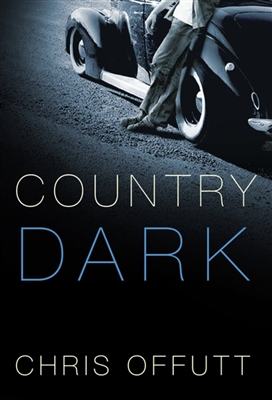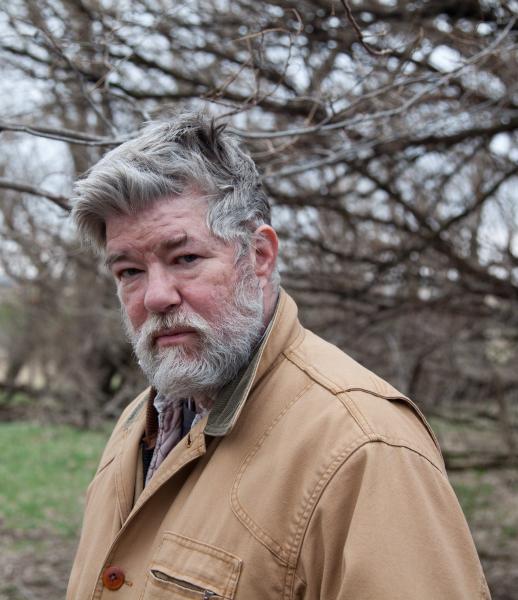Interview by Jana Hoops. Special to the Clarion-Ledger Sunday print edition (April 1)
 After nearly two decades, award-winning author and screenwriter Chris Offutt of Oxford has released his long-awaited next novel–and this time it is definitive Southern Gothic, as he lays out the story of Country Dark, a rough read about the tragic lives of one family as they face a difficult life situation, and a husband and father who can’t help but take matters into his own hands.
After nearly two decades, award-winning author and screenwriter Chris Offutt of Oxford has released his long-awaited next novel–and this time it is definitive Southern Gothic, as he lays out the story of Country Dark, a rough read about the tragic lives of one family as they face a difficult life situation, and a husband and father who can’t help but take matters into his own hands.
The story chronicles the family’s life beginning in 1954, when 18-year-old Korean war veteran Tucker returns to his Kentucky home and meets Rhonda, the 14-year-old girl who agrees on that day that they should be married. It carries readers through 17 tumultuous years of poverty, prison, and the despair of dealing with the eventual reality that four of their six children struggled with severe emotional or physical disabilities.
Offutt, who grew up in a community of 200 people on dirt roads in the hills of eastern Kentucky, is himself most comfortable in rural settings.
“I tried cities–Boston, New York, Los Angeles, and Albuquerque–and I didn’t like them,” he said. “I now live at the end of a dirt road in Lafayette County.”

Chris Offutt
His mastery in capturing the tone, the language, and the attitudes of the hill people shows through clearly in this tale of a good man who gets pushed too far, and resorts to violence at any any cost to save his large family.
Now an associate professor of English and screenwriting at the University of Mississippi, Offutt earned a bachelor’s degree in theatre from Morehead State University; and an MFA in fiction from the University of Iowa.
He has scripted five screenplays and two films, and has worked on the HBO drama True Blood and the Showtime series Weeds.
A versatile writer, Offutt’s previous books include My Father, the Pornographer in 2016, along with two other memoirs, No Heroes and The Same River Twice. Other fiction works include the novel The Good Brother and two story collections, Out of the Woods and his first book, Kentucky Straight. His work has appeared in The Best American Essays, The Best American Short Stories, and many other anthologies.
Your new novel, Country Dark, is a story of one man’s passion to keep his family together–a desire matched only by his willingness to eliminate any obstacle that would stand in his way. Tucker, the main character, is a complicated mix of compassion, tenderness, revenge, and violence. What was your inspiration for this character and this story?
People who live in the rural South are often portrayed negatively in the mainstream media, movies, and TV. I wanted to write a novel that showed rural people as smart, self-reliant, resourceful, loyal, and loving.
Initially, I’d planned to write a family saga of three generations. I became so enthralled by Tucker that I stuck with him for the entire book.
The story takes place in rural Kentucky from 1954 through 1971, and the characters’ lives are steeped in hardship and varying levels of despair. Why this time frame, and this place?
The book is set where I grew up. The biggest influence on me was the landscape and the adults. I wanted to examine both. Also, I was interested in writing about the “pre-technology” world of no cell phones and no computers.
People had telephone party-lines in their houses, which meant your neighbors could listen to conversations. As a result, nobody really talked personally. If you wanted to communicate with someone directly, you went to their house. In the hills, it was often shorter and easier to walk through the woods than along the roads.
When main characters Tucker and Rhonda first meet, they decide that day that they want to get married–and they go on to endure much heartbreak during their marriage. What was the glue that held them together so securely?
They met very young under difficult circumstances. They fell in love without quite meaning to–which is how most of us fall in love.
Couples of that era in the hills of Kentucky tended to stick together no matter what. Marriage is compromise and personal growth.
Rhonda and Tucker were lucky–they grew together, not apart. They accepted their difficulties and faced them head on as a team.
In the sad descriptions of Tucker and Rhonda’s disabled children, Hattie, the social worker, reminds her boss that “It’s not black and white here. It’s all gray.” Explain what she meant by that, in this family’s situation.
There is a tendency for many people to reduce everything to either/or, good/bad, black/white. It’s easy, but it’s short-sighted and wrong-headed. You see this often with politicians trying to get votes. It’s a divisive way to see the world, one that essentially translates to “us versus them.” I object to that viewpoint.
All humans are complex individuals who respond to their emotions and to a complicated world.
I’m using “black and white” as a metaphor for polar extremes. Everyone I know lives in the middle–the so-called gray area.
After writing three books of memoirs, why did readers have to wait so long for your next fictional work?
A couple of reasons. I needed to send my sons to college and had very little money when they were in high school. I worked in Hollywood to finance their education, which took me away from novels for eight years.
When they graduated from college, I moved to Mississippi and returned to fiction.
I was writing all along, but not in the sustained way that a novel requires. Right now, I have two other completed books–a collection of stories and another novel. Plus, I’m working on a new novel.
You grew up in rural Kentucky. What brought you to Oxford, and when?
I was one of those kids who couldn’t wait to leave my isolated rural environment. As a young man, I hitchhiked out of the hills and lived in several cities, where I never fit in. I then spent the next 30 years trying to get back to the country!
In 2011, I moved to Oxford to teach screenwriting and fiction writing at the University of Mississippi. I live outside of town and have never been happier or more productive.
Your work has been compared to that of the late Larry Brown of Oxford. Did you know him personally? And would you say that is an accurate description of your writing?
Yes, I knew Larry. He was very supportive of my first book, published in 1992. I used to come down and visit him. We’d go fishing and talk about books–in particular, Southern literature.
I’m not objective enough about my own work to know if our writing is similar. If it is, I’m flattered and honored by the comparison. I learned a lot from reading his books. He’s a great writer.
What’s next for your readers?
Novels and short stories. It is my sincere hope that my life is so boring and mundane that it will never again warrant a memoir! All I want to do now is make stuff up.
Chris Offutt will be at Lemuria on Thursday, April 12, at 5:00 to sign and read from Country Dark.


Comments are closed.